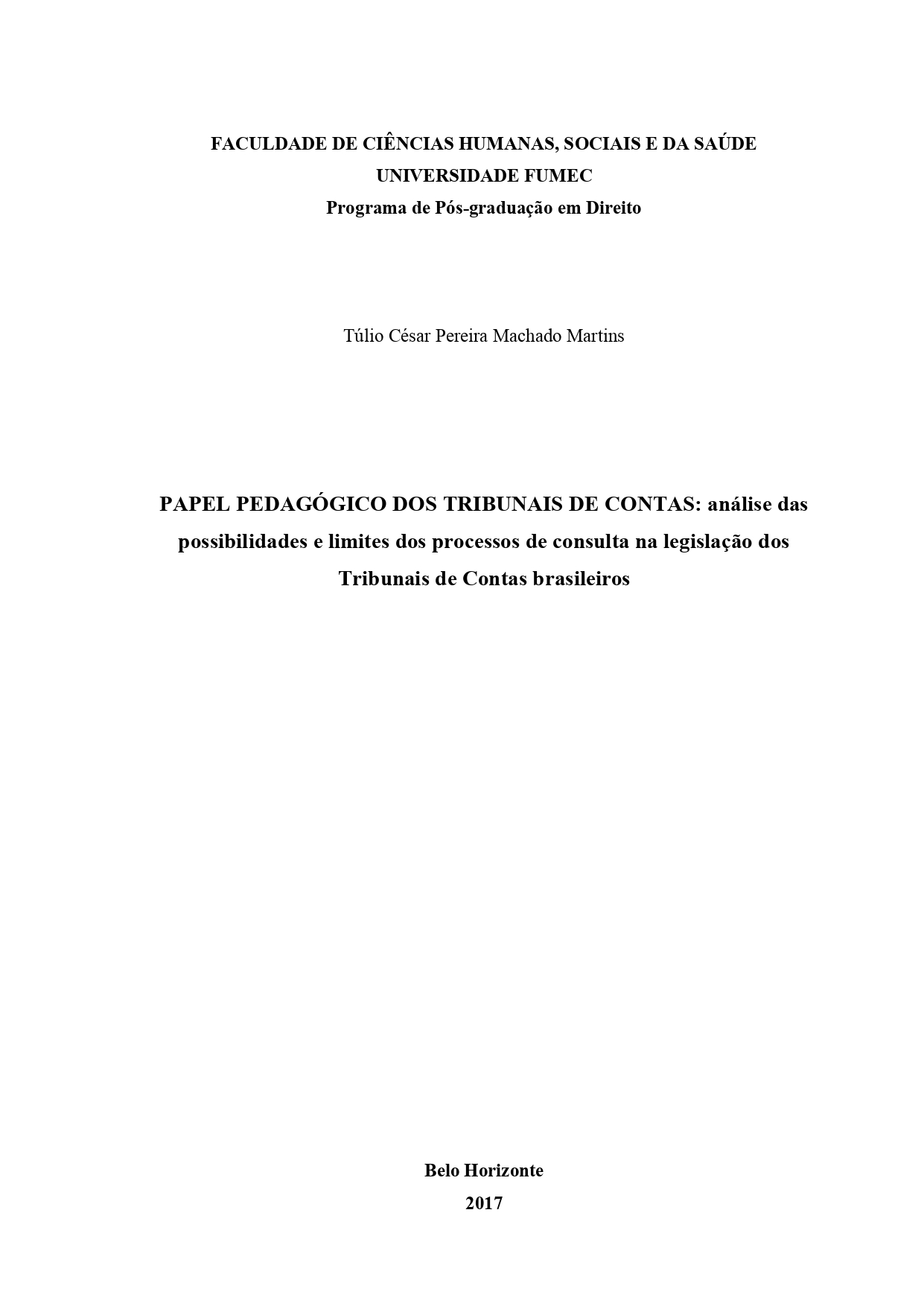Papel pedagógico dos tribunais de contas: análise das possibilidades e limites dos processos de consulta na legislação dos tribunais de contas brasileiros

Data
2017Autor
Martins, Túlio César Pereira Machado
xmlui.mirage2.itemSummaryView.MetaData
Mostrar registro completoResumo
Os Tribunais de Contas foram constitucionalmente instituídos e possuem importante papel na
proteção do erário e avaliação da gestão pública. Contudo, somente a verificação da
legalidade das contas públicas e a atividade de registro de atos de aposentadoria, enquanto
instrumentos de acompanhamento da gestão, de caráter repressivo e exercido a posteriori, têm
se mostrado insuficientes para o efetivo controle da Administração Pública. Assim, tem-se
investido em mecanismos de atuação preventiva, dentre os quais se destaca o exercício da
função pedagógica dos Tribunais de Contas por meio das respostas exaradas nos processos de
consultas. Contudo, por ser pouco problematizado pela doutrina e jurisprudência pátria,
indaga-se acerca de sua constitucionalidade e competência e dos desdobramentos quanto ao
caráter normativo dessa atuação, ou seja, como podem interferir na ação de todos os
jurisdicionados e não apenas do consulente e contribuir para a boa gestão pública e a
segurança jurídica. Por ausência de balizas claras de qual seja o papel nos processos em que
atua, a Corte ora age como órgão de assessoramento jurídico; ora apresenta parecer
meramente opinativo, que não vincula a apreciação do caso concreto. Pelo método jurídico-
diagnóstico e a partir das técnicas de coleta de dados primários e secundários (doutrina pátria)
foi estudada a legislação de todos os Tribunais de Contas brasileiros, para: (i) compreender as
formas de elaboração e a sistemática de divulgação das deliberações em processos de
consulta; (ii) verificar a aplicação dos entendimentos e seus impactos em casos concretos; (iii)
verificar qual o tratamento dado ao caráter normativo e às respectivas formas de divulgação
das manifestações exaradas em processos de consulta. Após análise dos dados, concluiu-se
que as formas atualmente adotadas pela divulgação das consultas são insuficientes para o
fomento do controle social e da boa governança pública. Em seu aspecto propositivo o
trabalho demonstra que deve haver a possibilidade de diferenciação de efeitos das respostas às
consultas, devendo ser verificado, em cada caso, o binômio interesse-necessidade em se
normatizar determinado assunto e, nos casos em que se pretenda estender os efeitos da
decisão a todos os jurisdicionados, é imprescindível que se utilize técnicas legislativas para
edição e divulgação dos seus resultados. The Courts of Audit are prescribed by the Constitution and have an important role in
protecting the treasury and evaluating public management. However, simply verification of
the legality of the public accounts and the activity of registration of public service retirements,
as instruments of management follow-up, of repressive and ex post facto character, have
proved insufficient for the effective oversight of the Public Administration. Thus, there has
been an investment in mechanisms for preemptive oversight, among which is the exercise of
the pedagogical activity of the Courts of Audit through the answers provided in the
consultation processes. However, because it is little problematized by the doctrine and
jurisprudence of the country, it inquiries about its constitutionality and competence and the
unfolding as to the normative character of this action, that is, how they can interfere in the
behavior of all the authorities and entities subjected to jurisdiction and not only the surveyed
ones. Because of the lack of clear markers of the role in the cases in which it operates, the
Court now acts as a legal advisory body; issuing a non-binding opinion, being that the former
is not within its competence and the latter does not contribute to public management, because
it creates more insecurity. Through the legal-diagnostic method and from the primary and
secondary data collection techniques (Brazilian doctrine), regulation regarding all the
Brazilian Courts of Audit, in order to: (i) understand the forms of elaboration and
systematization of dissemination of deliberations Consultation processes; (ii) verify the
application of the understandings and their impacts in concrete cases; (iii) to verify the
treatment given to the normative nature and the respective forms of disclosure of the
statements in consultation processes. After analyzing the data, it was concluded that the forms
currently adopted by the dissemination of the consultations are insufficient for the promotion
of social control and good public governance. In its propositional aspect, the work
demonstrates that there must be a possibility of differentiating the effects of the responses to
the consultations, and in each case the interest-need binomial must be verified to normalize a
certain subject and, in cases where the effects are intended to be extended of the decision to
all jurisdictions, it is essential that legislative techniques be used to edit and disseminate its
results.
